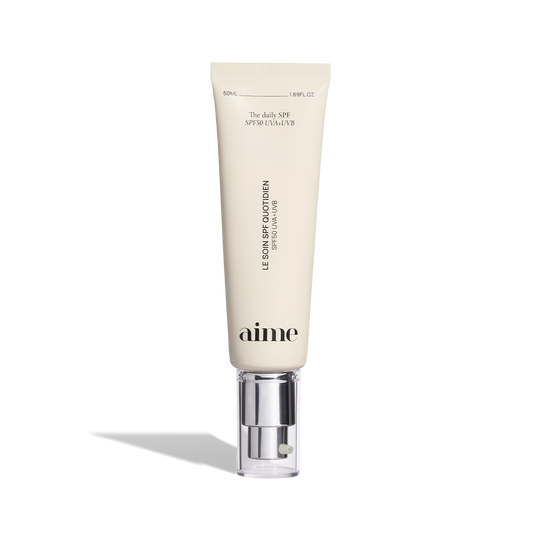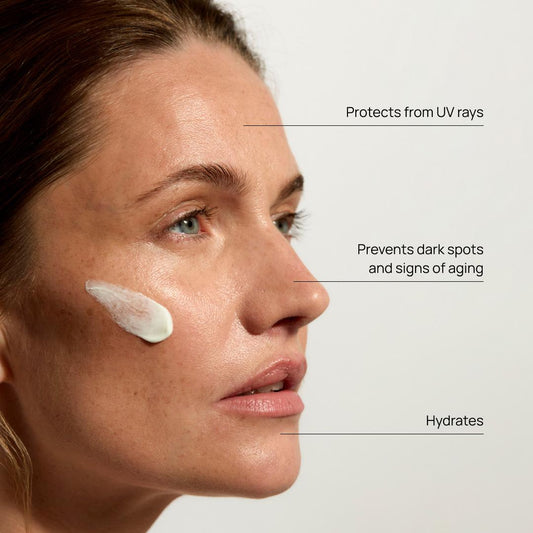What are sunscreens used for?
Sunscreens are active ingredients that block or deflect UV rays, protecting the skin from damage caused by sun exposure. They act as a shield against:
- UVB rays, responsible for sunburn
- UVA rays, which penetrate deeper into the skin and accelerate skin aging
Depending on their nature, they absorb, reflect or disperse these rays to limit their impact on the skin.
Organic (or chemical) filters
How they work:
They absorb UV rays and transform them into heat. Widely used in cosmetics, they allow for light and invisible textures on the skin.
Benefits :
- Fluid texture, not white
- Good cosmeticity (ideal under makeup)
- Broad spectrum of protection depending on the filters chosen
Please note:
- They take about 20 minutes to be active after application
- Their stability depends on their formulation
- Some chemical filters may be less well tolerated by sensitive skin.
At Aime, our Daily SPF50 Care combines 4 new-generation organic filters to guarantee hydration, high photostability and excellent skin tolerance, even for sensitive or acne-prone skin. Designed to effectively protect against UVA and UVB rays, it is used every morning as the last step in your skincare routine and, thanks to its moisturizing active ingredients, it can even replace your day cream.
Its fluid, invisible, and non-greasy texture instantly blends into the skin. The result: a simple, pleasant application that easily fits into a skincare routine, perfect for all skin types, even the most sensitive.
Mineral (or physical) filters
How they work:
They reflect UV rays off the skin's surface like a mirror to prevent them from penetrating the skin. The most common are titanium dioxide and zinc oxide.
Benefits :
-
Effective immediately after application
- Better tolerated by reactive or atopic skin
- Low risk of allergy
Please note:
- May leave a white finish, depending on concentration and particle size
- Less easy to formulate in very fluid textures
Sunscreens: how to make the right choice?
It all depends on your skin type, needs, and preferences.
Sensitive or reactive skin ? Choose mineral filters or formulas based on organic filters specially designed for sensitive skin, like our Daily SPF Care.
Need daily comfort? Opt for a new-generation sunscreen with organic filters, which is better tolerated and comfortable to wear. Because a good SPF is, above all, one you'll want to apply every day, comfort and sensory experience are just as important as the SPF.
Intense exposure or long days outdoors? Choose a broad-spectrum, water-resistant formula with SPF 50.
A better understanding of sunscreens allows you to choose the sunscreen best suited to your skin and lifestyle. Whether you opt for mineral or chemical filters, or a combination of the two, the bottom line remains the same: protecting your skin from the sun's effects every day .












